Catholics
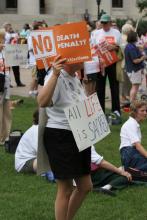
I AM AGAINST the death penalty in principle. The deliberate killing of prisoners does not demonstrate our society's respect for life, which we are trying to teach—especially to those who violate it. We simply should not kill to show we are against killing. It's also easy to make a, yes, fatal mistake, as alarming DNA testing has demonstrated, revealing some death row inmates to be innocent. In addition, the death penalty is clearly biased against poorer people, who cannot afford adequate legal representation, and is outrageously disproportionate along racial lines. The facts are that few white-collar killers sit on death row, and fewer are ever executed. And there is no evidence that capital punishment deters murder; the data just doesn't show that.
At a retreat I attended a couple of years ago, conservative activist Richard Viguerie approached me and said, "Jim, let's do something together to really shake up politics." Viguerie had become a friend, so I asked him what that might be. "I am a Catholic," Viguerie said. "I am against the death penalty, and I think it's time for conservatives and liberals who agree on that to begin to work together." I was fascinated at the thought of unlikely partners helping to accomplish that together. So we have had several dinner meetings over the last two years with both conservative and liberal leaders—mostly people of faith—to discuss the issue.
Here are some basic facts. There have been 1,312 executions since 1976, when the death penalty was reinstated following a 10-year moratorium. There were 43 prisoners killed in 2011, and 35 so far in 2012. As of April 2012, there were 3,170 people on death row. Forty-two percent are black, 43 percent are white, and 12 percent are Latino. Thirty-three states have the death penalty; 17 have abolished it and several have abolition legislation pending. Since 1973, 141 people have been exonerated and set free from death sentences because of new evidence—people who shouldn't have even been prisoners and were almost killed by the state due to false or faulty evidence. Eighteen of them were released because of DNA evidence. Who knows how many people have been executed unjustly?

BALTIMORE — The Catholic bishops gathered here for their annual meeting couldn’t agree on a statement on the economy on Tuesday morning, but with a unanimous voice vote that afternoon they easily backed a measure to push sainthood for Dorothy Day, whose life and work were dedicated to championing the poor.
Indeed, it was a remarkable moment for the reputation of Day, one of the most famous figures in 20th-century Catholicism.
Born in Brooklyn in 1897, Day lived a bohemian life in New York City in the 1920s while working as a leftwing journalist. She endured a failed marriage, a suicide attempt, and had an abortion when suddenly, after the birth of her daughter, she converted to Catholicism.
That decision confounded her literary friends but launched her on a new path of activism and piety.
BALTIMORE — A divided Catholic hierarchy on Tuesday failed to agree on a statement about the economy after a debate that revealed sharp differences over the kind of social justice issues that were once a hallmark of the bishops’ public profile.
The defeat of the document, titled “The Hope of the Gospel in Difficult Economic Times,” followed an hour of unusually intense debate among the 230 bishops gathered here for their annual meeting. It left many of them openly frustrated that the prelates have not made a joint statement about the nation’s economic woes four years after the recession hit.
“This document is dead,” New York Cardinal Timothy Dolan, president of the U.S. Conference of Catholic Bishops, said with obvious disappointment as he brought the gavel down on the debate after it failed to secure the two-thirds majority needed for passage.
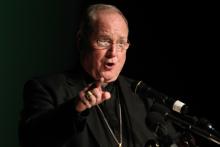
BALTIMORE — After sweeping setbacks to the hierarchy’s agenda on Election Day, New York Cardinal Timothy Dolan on Monday told U.S. Catholic bishops that they must now examine their own failings, confess their sins and reform themselves if they hope to impact the wider culture.
“That’s the way we become channels of a truly effective transformation of the world, through our own witness of a repentant heart,” Dolan, president of the U.S. Conference of Catholic Bishops, told the 250 bishops gathered here for their annual meeting.
“The premier answer to the question ‘What’s wrong with the world?’ is not politics, the economy, secularism, sectarianism, globalization, or global warming … none of these, as significant as they are,” Dolan said, citing many of the issues that have become favorite targets of the hierarchy.
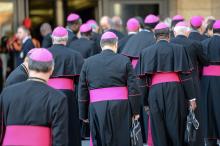
As the bishops gather in Baltimore this week for their annual meeting, they like everyone else in the country will be talking about last week’s election. The U.S. Catholic bishops took a beating at the polls. Not only was President Obama reelected, despite their attacks on him, the bishops also lost on state referendums on same-sex marriage.
Like all Americans, the bishops have a constitutional right to participate in the political process. They can debate the issues, criticize candidates and publicly express their views. They can even endorse candidates as long as they don’t do it on church property and don’t use church funds in supporting a candidate or party. In fact, they can even run for president as did Rev. Pat Robertson and Rev. Jesse Jackson. The U.S. Constitution does not forbid this; Roman Catholic canon law forbids it.
But what is constitutional is not always effective or prudent. Clearly the political strategy of the bishops is not working. A majority of Catholics voted for Obama and gay activists won every referendum. The Missouri and Indiana Republican senatorial candidates, who took the toughest positions on abortion, were also defeated when the Republicans were expected to win these races.
So where do the bishops go from here?

A number of Roman Catholic bishops are making forceful last-minute appeals to their flock to vote on Election Day, and their exhortations are increasingly sounding like calls to support Republican challenger Mitt Romney over President Barack Obama.
The most recent example: a letter from Illinois Bishop Daniel Jenky accusing the administration of an unprecedented “assault upon our religious freedom” and implying that Catholics who pull the lever for Democrats who support abortion rights are like those who condemned Jesus to death.
“Since the foundation of the American Republic and the adoption of the Bill of Rights, I do not think there has ever been a time more threatening to our religious liberty than the present,” Jenky writes in the letter, which he ordered priests in his Peoria diocese to read at all Masses on Sunday.
In the letter, Jenky blames Obama and the Democratic majority in the Senate for trampling on the Catholic Church’s rights and moral convictions by requiring health insurers to provide contraception coverage. Jenky also compares abortion rights supporters to the Jewish crowd in Jerusalem that pledged loyalty to the Roman Empire and demanded that Pontius Pilate crucify Jesus.
“For those who hope for salvation, no political loyalty can ever take precedence over loyalty to the Lord Jesus Christ and to his Gospel of Life,” Jenky writes.
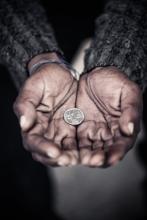
More American Catholics believe their religious leaders should be focused on issues related to poverty and social justice during this election season, rather than spending time and energy on other issues such as abortion, according to a new survey released this week by the Public Religion Research Institute.
The results of the 2012 American Values Survey demonstrate that American Catcholics -- and the "Catholic vote" -- is far from the monolith some politicians might like to believe they are.
"The survey confirms that there is no such thing as the 'Catholic vote,'" Robert P. Jones, CEO of PPRI and co-author of the report, told Reuters. "There are a number of critical divisions among Catholics, including an important divide between 'social justice' and "right to life' Catholics."
For instance, on the question of the public engagement of the church, the 2012 American Values Survey found important divisions between Catholics who prefer a “social justice” emphasis that focuses on helping the poor and Catholics who prefer a “right to life” emphasis that focuses on issues such as abortion.
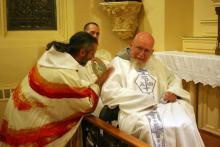
The Rev. Benedict Groeschel, a well-known Catholic author and television personality, has given up his longtime spot on the conservative cable network EWTN following comments in which he appeared to defend clergy who abuse children while blaming some victims.
“Father Benedict has led a life of tremendous compassion and service to others and his spiritual insights have been a great gift to the EWTN family for many years. We are profoundly grateful to him and assure him of our prayers,” Michael P. Warsaw, head of EWTN Global Catholic Network said in announcing Groeschel’s decision to step down.
In his statement on Monday Warsaw also asked EWTN viewers “to pray for all those who have been affected by this painful situation and in particular those who have been victims of sexual abuse.”
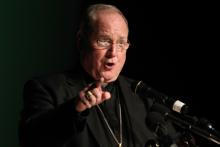
In a move that could recast the reigning political narrative about the Catholic bishops, Cardinal Timothy Dolan has accepted an invitation to deliver the closing benediction at the Democratic National Convention, a week after he gives a similar blessing to the Republicans in Tampa, Fla.
From the start, Dolan, who is also president of the U.S. Conference of Catholic Bishops, made it clear that he would be willing to pray at the Democratic convention. There were doubts, however, that the Democrats would invite Dolan.

After the movie theater massacre in Aurora, Colo., and a deadly shooting at a Sikh temple in Oak Creek, Wis., Americans are divided on gun control, and within certain religious groups, attitudes are far from ambivalent.
But on the question of guns in churches, there is actual consensus: A strong majority of Americans don’t want them in the pews, according to a new poll released Wednesday (Aug. 15) by the Public Religion Research Institute conducted in partnership with Religion News Service.
"Although the issue of gun control tends to divide Americans by party, gender, region and race, there is broad agreement among the public that there are some places where concealed weapons should be off limits," said Daniel Cox, PRRI’s research director.
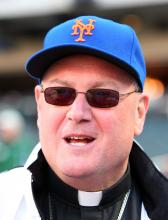
By tradition, the storied Al Smith Dinner has provided a few hours of comic relief from the angry volleys of the campaign trail – a white-tie charity banquet held in the weeks before Election Day, hosted by the archbishop of New York and featuring speeches by the two presidential candidates on the condition that they lob nothing more than good-natured jibes.
But the Catholic hierarchy’s fierce feud with President Obama, abetted by the increasingly sharp tone of the 2012 elections, is threatening to invade this demilitarized zone and give New York Cardinal Timothy Dolan a case of pre-dinner agita.
Dolan has reportedly extended an offer to Obama (as well as his Republican opponent, Mitt Romney) to attend this year’s dinner at the Waldorf-Astoria, scheduled for Oct. 18, and the president has accepted. That has mobilized abortion opponents, who view Obama as the worst thing since Roe v. Wade and an enemy of religious liberty because of his administration's controversial birth control mandate.
The Rev. Frank Pavone, head of Priests for Life, a leading abortion opponent based in Staten Island, said on Aug. 6 that “the polite putting aside of differences for a while amounts to scandal.”
A new poll shows that American Catholics tend to agree with their bishops’ concerns that religious liberties are at risk in the U.S.
Nevertheless, Catholics seem to be warming to President Obama, even as the bishops lambaste his administration in their fight to roll back a federal mandate that requires employers — with some exceptions — to cover birth control in their health plans.
The poll, released on Aug. 1 by the Pew Forum on Religion & Public Life as the contraception mandate took effect, found that among Catholics who are aware of the bishops' protests, 56 percent say they agree with the bishops’ concerns, as opposed to 36 percent who disagree.
AFTER THE VATICAN’S “hostile takeover” of the Leadership Conference of Women Religious in April, I was particularly struck by one joke I encountered: “Go Catholic ... and leave the thinking to us.”
I laughed—but not much. That one, it seems, is too close to the truth these days.
The Leadership Conference of Women Religious (LCWR), a major educational center for superiors of Catholic women’s religious orders in the U.S., was launched in 1956 at the urging of the Vatican. For years, it has been a venue where officers of every congregation of women religious are invited to meet, study, and consider together the role and place of women religious in the resolution of the issues of the time. Now the LCWR has been put under the control of three bishops: Peter Sartain of Seattle; Leonard Blair of Toledo, Ohio; and Thomas John Paprocki of Springfield, Illinois.
The officers and body of the LCWR—all superiors, prioresses, or other officials of major, longstanding institutions—are no longer authorized to plan its programs, engage its speakers, or create and implement its structures. Instead, Sartain, Blair, and Paprocki have been appointed to oversee the group: to approve its programs, create its constitutions, determine its operational procedures, and define the content of its conferences. As in, “Leave the thinking to us.”
As in, women can’t do it themselves. Or, women aren’t moral agents. Or, women don’t know what they’re doing. Or, the girls need to be controlled. Or, father knows best.
A group of Catholic Sisters set off for the Nuns on the Bus tour, speaking out against the House Republican budget that cuts funding for safety net programs and hurts those already in poverty.
NETWORK, a Catholic social justice group, is sponsoring the road trip, which departed from Ames, Iowa today.

Amy and I have been working (translated: watching lazily) our way through the first several seasons of Mad Men. The writing is remarkably subtle, and I was particularly struck by the fact that such a long-standing show could effectively have little or no plot focusing instead on rich character development.
For a writer, this is like enjoying a gourmet meal every night.
But the cherry on top for me is the sprinkling of anachronisms that apparently made plenty of sense at the time, but which are shockingly out of place now. There was a scene of the main family in the park, and when they’re done, the mother gives the blanket a good flick and leaves all of their trash wherever it falls. There’s also the constant smoking, even around kids and by pregnant wives (the perfect antidote for nausea, apparently), drinking at work and brazenly racist comments as the cultural norm.
Hard to believe sometimes that this took place so recently that my parents were teenagers when it took place.
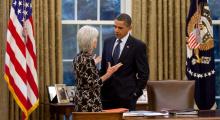
In an unexpected blow to the Obama administration and a major boon for America's Catholic bishops, the influential Catholic Health Association on June 15 rejected White House proposals aimed at easing faith-based objections to the contraception mandate.
“The more we learn, the more it appears that the … approaches for both insured and self-insured plans would be unduly cumbersome and would be unlikely to adequately meet the religious liberty concerns of all of our members and other Church ministries,” Sister Carol Keehan and leaders of the CHA said in a five-page response to the Department of Health and Human Services.
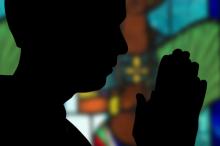
Amid continuing headlines about cover-ups of child abuse in the Catholic Church, an oversight board of lay Catholics on June 13 warned the nation’s bishops that they must follow their own policies against abuse more rigorously if they hope to restore their fragile credibility.
“If there is anything that needs to be disclosed in a diocese, it needs to be disclosed now,” Al J. Notzon III, head of the bishops’ National Review Board, told some 200 prelates gathered in Atlanta for their annual spring meeting. “No one can no longer claim they didn’t know.”
The meeting of the U.S. Conference of Catholic Bishops comes 10 years after the hierarchy met in Dallas and passed a series of reforms to respond to a siege of bad publicity about sex abuse by priests. It also comes as a jury in Philadelphia weighs the fate of a high-ranking priest who's facing criminal charges of concealing abuse by clerics, and as a bishop from Missouri awaits trial on charges that he failed to report a suspected child molester to authorities.
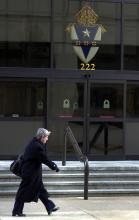
Ten years ago, the Roman Catholic sex abuse scandal dominated the headlines with horrific stories of priests preying on vulnerable youths and a church hierarchy more concerned with protecting clergy instead of kids.
Now, it's back. A Philadelphia jury is deliberating whether, for the first time, a high-ranking church official will be held criminally accountable.
However the jury rules, the case carries symbolic freight far heavier than the grim details in the trial of Monsignor William Lynn, former secretary for the clergy in the Archdiocese of Philadelphia. It revives the breadth and depth of the abuse crisis, its extraordinary costs and unending frustrations.
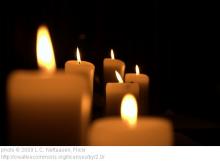
Catholics around the U.S. are coming together for prayer vigils as a show of support for America's nuns, whom the Vatican accuses of having "serious doctrinal problems."
The Wednesday (May 30) vigil at St. Colman Catholic Church in Cleveland follows a Vatican move last month to intervene and reform the Leadership Conference of Women Religious, an umbrella organization that represents the leaders of most U.S. nuns.
Similar rallies have already been held or are planned from Anchorage, Alaska to Boston, organized by the loose-knit Nun Justice Project, a coalition of lay reform groups.
The Vatican scolded the LCWR for making statements that "disagree with or challenge positions taken by the bishops, who are the church's authentic teachers of faith and morals."
The crackdown has caused an uproar among some Catholics, sparking dozens of vigils in cities across the country.

The film shows a burning crucifix, gun-toting priests and the torture of a young boy. And the Roman Catholic hierarchy is loving it.
The film, “For Greater Glory,” hits theaters on June 1 and tells a little known chapter of Mexican history -- the Cristero War of 1926 to 1929, which pitted an army of devout Catholic rebels (led in the movie by Andy Garcia) against the government of Mexican President Plutarco Calles (played by Ruben Blades).
For Catholics enraged by the Obama administration’s proposed contraception mandate, the film about the Mexican church's fight in 1920s is a heartening and timely cinematic boost in the American church's battle to preserve "religious freedom" in 2012.